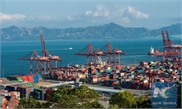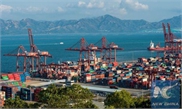
Photo: IC
The Chinese economy grew by 6.3 percent year-on-year in the first half of the year. In the second quarter, it expanded by 6.2 percent from a year ago, the lowest growth rate in the past 27 years. While future of China-US trade war remains uncertain, the data left a pessimistic impression on the Chinese people.
Chinese were used to high growth rates of around 8 percent, or even double-digit figures. But realizing a high figure is not aimed at showing off. Be it 6.3 percent or lower, it can be seen as a good performance compared to the rest of the world. China still leads the major economies when it comes to growth.
The Chinese government has recently reiterated that it will not adopt strong stimulus policies for the economy. That's because the Chinese economy needs healthy development. Strong stimulus policies come with economic data that looks good, but what ordinary people want is better living standards.
China is seeing the largest-ever economic transformation driven by the government's proactive regulation. The fundamental direction of this transformation is to put people first. During the process, we see less pollution and increasing ecological principles of economic development. At the same time, consumption is gradually taking center stage among the driving forces of the country's economy.
Fairness has received greater attention from society. Solving income inequality and unbalanced economic development in different regions has become a major policy orientation.
The protection of the private economy has once again become the focus of China's economic policy over the past year. Small and micro businesses are being supported. Although the China-US trade war is escalating, new breakthroughs have constantly been made in Chinese policies in terms of opening-up. Despite a slowdown in China's GDP growth rate in recent years, the quality of the growth continues to rise. With the improving environment and city governance and rapid transition from a traditional economic model to a new economic model, the Chinese people's lives have changed fast.
China once experienced an overheating economy plagued by a high-level of resource consumption and pollution, severe corruption and repeated construction. Although GDP data was high, it was not sustainable and there was a large amount of waste, which failed to improve people's lives. The economic adjustments over the years are undoubtedly correct. The quality of our life is improving.
Of course, the downward pressure on the economy is a great challenge that must be taken seriously by all local governments.
Is it possible to achieve a higher economic growth rate? We should not give up seeking this possibility. For instance, many places are striving to drive economic growth with what they call a "nighttime economy" (business activities between 6 pm and 6 am in the service sector). This is something which must be explored for economic growth.
Houses are meant to be lived in, not for speculation. This principle must be adhered to. But the current purchase restriction curtails normal demand. Can real estate governance be improved to satisfy the demand for living?
High-quality development should correspond to people's desire for a better life. City management should put people's convenience, safety and comfort up front. Cities should value order, pluralism and freedom.
China has enormous economic potential. There is still much room to reshape ordinary people's life, which is the core of the potential. That makes China one of the most promising major economies. Much remains to be done in unleashing its full potential.


